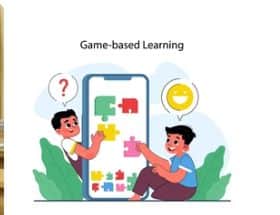Games have long been a source of entertainment, but their role in education has grown significantly over the years. Educators now recognize the profound value that games bring to the learning environment, both in terms of academic development and essential life skills. This article explores the value of games in education, focusing on how they enhance learning, foster social and emotional development, and encourage creative problem-solving.

Enhancing Learning Through Engagement One of the primary reasons games are valuable in education is their ability to engage students in the learning process. Traditional teaching methods often rely on passive learning, where students absorb information through lectures, reading, or writing. In contrast, games offer an interactive experience that makes learning more dynamic and enjoyable. Educational games require active participation, which helps students retain information more effectively.For instance, educational video games designed to teach math, science, or language skills often incorporate complex problem-solving tasks that require critical thinking. Games like “Minecraft: Education Edition” allow students to explore historical events, build civilizations, or practice coding in a virtual environment. By offering an immersive experience, games help students understand abstract concepts in a tangible way, making learning more accessible and fun.Additionally, games provide instant feedback, allowing students to learn from their mistakes and adjust their strategies in real time. This immediate reinforcement promotes a growth mindset, encouraging students to view challenges as opportunities to improve rather than as insurmountable obstacles.

Developing Social and Emotional Skills Games, especially multiplayer or team-based ones, also play a critical role in developing social and emotional skills. Cooperative games teach students the value of teamwork, communication, and leadership. They learn to collaborate, negotiate roles, and work toward a common goal, which mirrors the dynamics they will encounter in the workforce and other real-world settings.For example, group-based board games like “The Game of Life” or team-oriented video games like “Rocket League” require players to strategize and coordinate with one another to succeed. In doing so, students develop empathy, learn how to handle failure gracefully, and build resilience.
These games teach students that success is not always individual but often relies on collective effort, understanding different perspectives, and leveraging the strengths of others.Games also provide a low-stakes environment for students to experience and manage emotions such as frustration, excitement, and disappointment. In this way, they serve as valuable tools for emotional regulation. Students who play competitive games learn to cope with losing and bounce back with renewed determination, an important life skill that fosters persistence and grit.
Fostering Creative Problem-Solving another significant benefit of games in education is their capacity to foster creative problem-solving. Many games require players to think outside the box, analyze situations from multiple angles, and devise innovative solutions to complex problems. Puzzle games like “Portal” or strategic games like “Civilization” encourage players to experiment with different approaches to overcome obstacles, teaching flexibility and adaptive thinking.In educational settings, this type of problem-solving translates to better academic performance.
Games often present challenges that have no single correct answer, encouraging students to explore multiple possibilities and make informed decisions based on the information at hand. This helps develop critical thinking skills, as students must evaluate evidence, make predictions, and adjust their strategies accordingly.Moreover, games that incorporate elements of design or simulation allow students to engage in creative expression. Whether it’s building a world in “SimCity” or designing a custom character in a role-playing game, students learn to create, modify, and experiment within set parameters, honing both their technical and artistic skills.

Bridging the Gap Between Theory and Practice Games in education also serve as an effective bridge between theoretical knowledge and practical application. In many subjects, particularly STEM (science, technology, engineering, and mathematics) fields, games provide a platform for students to apply abstract concepts in real-world scenarios. For example, simulation games like “Kerbal Space Program” allow students to design and launch their own spacecraft, applying principles of physics, engineering, and mathematics in a way that feels more tangible than traditional textbook exercises.Furthermore, educational games are particularly effective for students who may struggle with conventional learning methods. Visual and kinesthetic learners, for example, benefit from the hands-on nature of games, which offer an alternative way to grasp complex ideas. This diversity of learning experiences makes games an inclusive tool that can cater to a wide range of educational needs.
The value of games in education extends far beyond mere entertainment. They provide an interactive and engaging learning experience, enhance social and emotional development, and foster creative problem-solving. By bridging the gap between theory and practice, games offer a powerful tool for both educators and students, promoting a deeper, more meaningful understanding of academic content and essential life skills. As educational systems continue to evolve, the integration of games will likely play an even more prominent role in shaping the future of learning.




